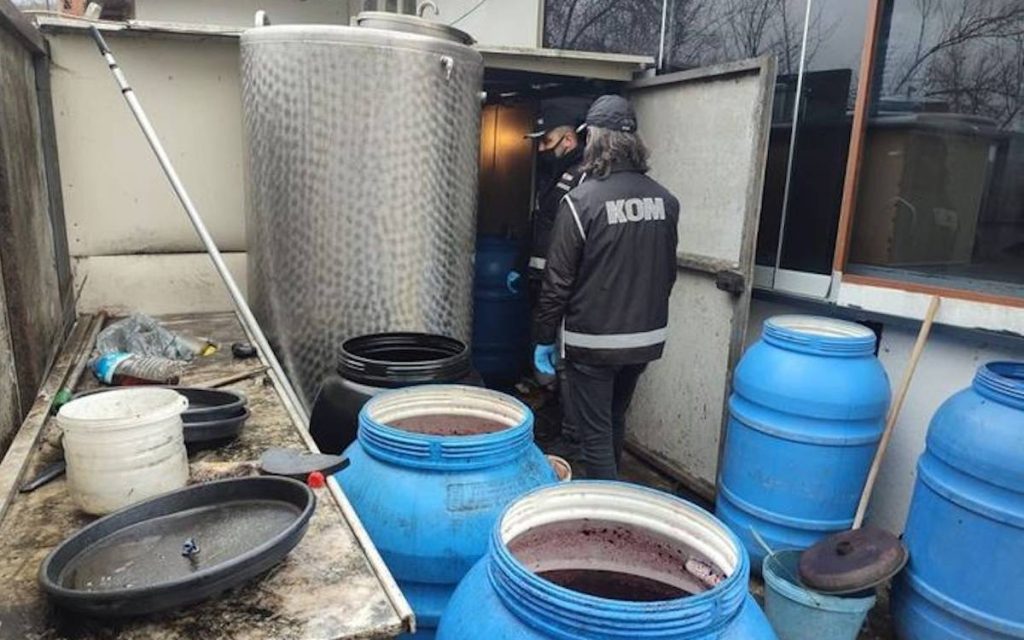In a tragic incident in Ankara, at least 54 individuals have lost their lives due to the consumption of counterfeit alcohol, with 40 others currently receiving intensive medical care. Forensic reports from the Ankara Chief Public Prosecutor’s Office indicate a serious public health crisis stemming from counterfeit alcohol consumption, prompting investigations into the production and distribution networks behind these deadly substances. Authorities have detained 28 suspects linked to the ordeal as part of an extensive inquiry targeting smuggling practices and potential criminal negligence.
| Article Subheadings |
|---|
| 1) High taxes and weak regulation |
| 2) Methanol-laced alcohol behind fatalities |
| 3) Government response to the crisis |
| 4) Public awareness campaigns needed |
| 5) Future implications for alcohol regulation |
High taxes and weak regulation
The issue of counterfeit alcohol in Turkey has partially been attributed to the government’s high taxes on alcoholic beverages, combined with inadequate regulatory oversight. The Chamber of Chemical Engineers (TMMOB) has long been vocal about the adverse effects of these economic policies, asserting that they inadvertently promote the production of counterfeit alcohol as consumers seek cheaper alternatives. This advocacy group highlighted the drastic increase in the Special Consumption Tax (ÖTV) on alcoholic drinks, which has risen to 1,428 liras for beverages with high alcohol content in 2025, compared to 1,269.73 liras the previous year. Such heavy taxation can lead to a situation where a substantial portion of the price ordinary consumers pay for traditional alcoholic beverages, such as rakı, is represented by taxes, pushing those with lower incomes toward illicit products.
Methanol-laced alcohol behind fatalities
One of the leading causes of the recent fatalities has been identified as methanol, a highly toxic substance often used improperly in counterfeit alcohol. The TMMOB brought attention to the differences between counterfeit and smuggled alcohol, clarifying that counterfeit products are typically branded and packaged to mislead consumers, whereas smuggled alcohol may consist of homemade brews. The consequences of consuming methanol-laden beverages can be dire; initial symptoms might affect the central nervous system, escalating to severe health complications, including respiratory failure and even death. The chamber emphasized that the production of alcohol should be strictly regulated, as it requires specific chemical knowledge and proper industrial conditions to ensure safety.
Government response to the crisis
In light of these events, government officials have moved swiftly to address the underlying issues surrounding counterfeit alcohol. This includes the formation of a multi-agency task force to investigate the origins of the illegal alcohol trade and to crack down on producers and distributors. Arrests have already been made, with 28 suspects detained and another 25 under judicial supervision prior to their release. The government’s rapid response is critical, not only to bring justice to the families affected by this tragedy but also to prevent similar incidents in the future. In tandem with law enforcement efforts, health officials are reinforcing their campaigns about the dangers of consuming unregulated alcohol, aimed at reducing further risks to public safety.
Public awareness campaigns needed
Public education about the risks associated with counterfeit alcohol has been lauded as a vital element in combating this crisis. The TMMOB called for enhanced public awareness campaigns to educate consumers about the dangers of counterfeit alcohol, particularly concerning methanol. These efforts should aim not only to inform the public about the acute dangers of consuming illicit products but also to change perceptions about alcohol consumption more broadly. Such campaigns would ideally provide information on identifying counterfeit products, the health risks associated with these beverages, and guidance on safe consumption practices. The chamber stressed the need for an informed public capable of making safer choices, ultimately reducing the market for counterfeit alcohol.
Future implications for alcohol regulation
As the investigation unfolds, the future of alcohol regulation in Turkey remains uncertain. The events leading up to this tragic loss of life may require a significant reevaluation of the current policies, particularly concerning taxation and regulatory practices. Experts are urging the government to focus on better regulation of the alcohol market instead of relying solely on punitive measures like increased taxes. There are calls for a balanced approach, combining reasonable taxation, robust enforcement of regulations, and public health initiatives aimed at controlling alcohol consumption effectively. Reforming the existing framework could be pivotal in ensuring consumer safety and preventing the emergence of counterfeit alcohol as a pressing public health issue.
| No. | Key Points |
|---|---|
| 1 | At least 54 people have died from counterfeit alcohol in Ankara. |
| 2 | Authorities detained 28 suspects related to the counterfeit alcohol trade. |
| 3 | High taxes and poor regulation are factors contributing to counterfeit alcohol production. |
| 4 | Methanol poisoning is a significant risk associated with counterfeit alcohol. |
| 5 | Public awareness campaigns are considered essential to educate consumers about the dangers of counterfeit alcohol. |
Summary
The recent tragedy in Ankara brought to light critical issues related to the production and consumption of counterfeit alcohol in Turkey. With multiple fatalities and health risks slowly revealing a public health crisis, the overview suggests an urgent need for both stricter regulations and community awareness to combat these dangers. This situation not only raises questions about existing policies but also emphasizes the importance of balancing taxation with effective regulation to ensure consumer safety. The ongoing investigation could lead to significant reforms that will hopefully prevent future calamities of this nature.
Frequently Asked Questions
Question: What caused the deaths in Ankara?
The deaths resulted from consuming counterfeit alcohol, with methanol being identified as a significant toxic component in many of the products consumed.
Question: How many individuals are in intensive care following the incident?
Currently, 40 individuals are reported to be in intensive care after consuming counterfeit alcohol in Ankara.
Question: What actions are authorities taking regarding the counterfeit alcohol crisis?
Authorities have arrested 28 suspects linked to the production and distribution of counterfeit alcohol and are investigating the broader smuggling networks involved.


